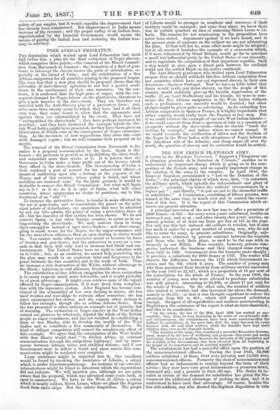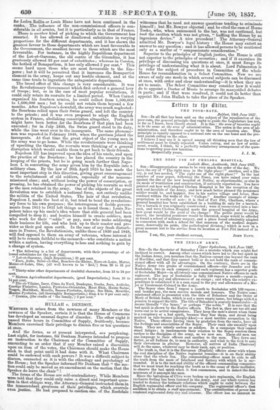THE NEW FRENCH PRIETORIAN ARMY.
A PAPER in the Moniteur Universe', "Rapport a l'Empereur sur la situation generale de la Dotation do l'Armee," enables us to understand an important change which is going on in the composition of the French army, and an equally important change in the relation of the army to the country. In April 1855, the Emperor Napoleon promulgated a "law on the Dotation of the Army,"—the principal objects of which were, first, "to entertain the military spirit, which upholds the independence and glory of nations " ; secondly, "to better the soldiers' circumstances by a higher pay " ; and thirdly, "to put an end to the shameful traffic in substitutes." A Commission, consisting of fifteen persons, was named at the same time, to watch over and to control the execution of this law. It is the report of this Commission which attracts our present attention. A principal provision of the new law was to offer a premium of 2300 francs—or 921.—for every seven years' enlistment, besides an inereased pay, and so on ; and after twenty-five years' service, an annual pension of at least one franc per day or 151. in the year. Not only has this law induced old soldiers to reenlist, but it also has made it easier for a great number of young men, who do not like to enter the army-, to procure substitutes. Originally, substitutes were obtained by private contract between the recruits and those who took their place, as used to be the ease with us formerly in our Militia. More recently, however, private companies undertook the business, and they charged sums varying from 1231. to 1361. Government does the business more cheaply; it provides a substitute for 2860 francs or 112/. The reader wil observe the difference between the 112/. which Government receives and the 92/. which it pays. The number of young men who thus purchased their freedom from military service amounted in the year 1855 to 22,427, which is a proportion of 16 per cent of the conscription for the whole of France. In the year 1856, the number of young men who were allowed to purchase substitutes was still greater, amounting to 23,636, or about 17 per cent for the whole of France. On the other side the number of soldiers who wished to reenlist had also increased far above the demand, namely to 36,575 • so that it was thought expedient to reduce the premium from 901. to 604, which still procured substitutes enough. Stripped of all superfluities and matters uninteresting to Englishmen the substance of the report is what we have described; and this is its conclusion " On the whole, the law of the 26th April 1856 has worked so successfully, that, from its very beginning in the midst of exceptionally difficult circumstances, the reenlistments have been more numerous than the denland for substitutes, in the same time that the army has Been its ranks increase with old and tried soldiers, while the families have kept more children than over on the domestic hearth.
"The dotation of the army, this creation of a powerful Executive Government, inspired by the love of wellbeing and progress—this great and useful institution, formed as a medium between the interests of the population and the stability of the Government—has been elevated from its beginning to the height of its importance and its national mission."
The reenlistment has had a powerful effect upon the position of the noncommissioned officers. During the year 1855, 22,800 soldiers reehlisted ; of these, 9144 were privates and 13,656 were noncommissioned officers. Formerly the class privates, officers had no inducement to remain beyond the term of their service; they now have very great inducement—a premium down, increased pay, and a pension in their old age. The desire to reenlist in excess of the demand for substitutes has given the Government the additional advantage of picking its men, and it is understood to have used that advantage. Of course, besides the less able soldiers, any who showed the slightest disposition to vote for Ledru Rollin or Louis Blanc have not been continued in the ranks. The influence of the non-commissioned officers is considerable in all armies, but it is particularly so in that of France.
There is another kind of picking to which the Government has resorted. It has allowed or disallowed substitutes in varying proportions for the different departments, and it has shown the greatest favour to those departments which are least favourable to the Government, the pallest favour to those which are the most favourable. For instance, in the highly Republican department of the Lot-et-Garonne, the old centre of the Girondins, it has graciously allowed 33 per cent of substitutes ; whereas in Corsica, the hotbed. of Bonapartism, it has only allowed 2 per cent.* This seems hard, upon those who are most favourable to the Emperor; but it will be perceived that it increases the Bonapartist element in the army, keeps out any hostile element, and at the same time tends to ingratiate the antagonistic departments.
The broad effect of this change is very considerable. It was the Revolutionary Government which first ordered a general levy of troops; but, as in the case of most popular revolutions, it could only retain its recruits for a limited period. When Carnet organized his fourteen armies, he could collect from 1,500,000 to 1,600,000 men ; but he could not retain them beyond a few months. After Napoleon's downfall, the army was much neglected; the Bourbons relied upon their Swiss guard, and left the country to the priests; and it was even proposed to adopt the Thighs system in France, abolishing conscription altogether. Perhaps it might have been better for the Bourbons if that plan had been executed ; for in July 1830, the Swiss guard stood to its duty, while the line went over to the insurgents. The same phenomenon was repeated in February 1848, when the garrison joined the insurgents. At that time the great object of the young men in the army was to go home. While the revolutionists were thinking of upsetting the throne, the recruits were thinking of a general disruption which would enable them to get back to their friends. Napoleon III has improved upon the idea of his uncle, and upon the practice of the Bourbons ; he has placed the country in the keeping of the priests, but he is going much further than Napoleon L in eonverting the army given him by the Republic into a military class. By the law of 26th April 1825 he has made the most important step in this direction, giving great encouragement to the rei!nlistment of old soldiers, especially of the noncommissioned class ; and, without losing the power of conscription, or pressing, he has obtained the power of picking his recruits as well as the men retained in the army. One of the objects of the great Revolution was to establish a national force, not entirely unlike the militia of the 'United States. The heir of that revolution, Napoleon I, made the best of it, but tried to bend the revolutionary force to his own purposes; the interregnum of feeble governments from 1815 to 1831 left things as it found them ; Louis Napoleon takes up his uncle's idea where that able general had been compelled to drop it; and bestirs himself to create soldiers, men who work for their " soldo " or pay, men who make soldiering their business for life, and who look up to their master and provider as their god upon earth. In the case of any fresh disturbance in France, the Revolutionists, unlike those of 1830 and 1848, will find opposed to them an army of veterans, whose interest it will be to remain faithful to the monarch—who constitute a nation within a nation, having everything to lose and nothing to gain by a change of system.
* The following is a list of departments, with their percentage of allowed substitutes for the year 1855.
" Lot-et-Garonnei (high Republican) 31 per cent.
" Eure, Aube, Seine-et-Oise, Bouches-du-Rh6ne, Eure-et-Loire, Marne, Maine-et-Loire, Oise, (all well known to be Red,') from 26 to 31 per
cent.
"Thirty-nine other departments of doubtful character, from 15 to 24 per cent.
"Sixteen Agriculturalist departments, (good Imperialistic) from 10 to 14 per cent. " Ille-et-Tilaine, Isere, Chtes du Nord, Dordogne, Denbo Jura, Ardeche, Conige Finistere, Landes, PyrSnees-Orientales, Haut Mill, Haute Saone, Vosges, Morbihan, Moselle, Basses-Pyrenees, AriSge, Bas Rhin, Meurthe, Hautes pyrSnees, (all thoroughly Bonapartiatic) from 4 to 9 per cent only.
"Corsica, (the cradle of the family,') 2 per cent."



























 Previous page
Previous page